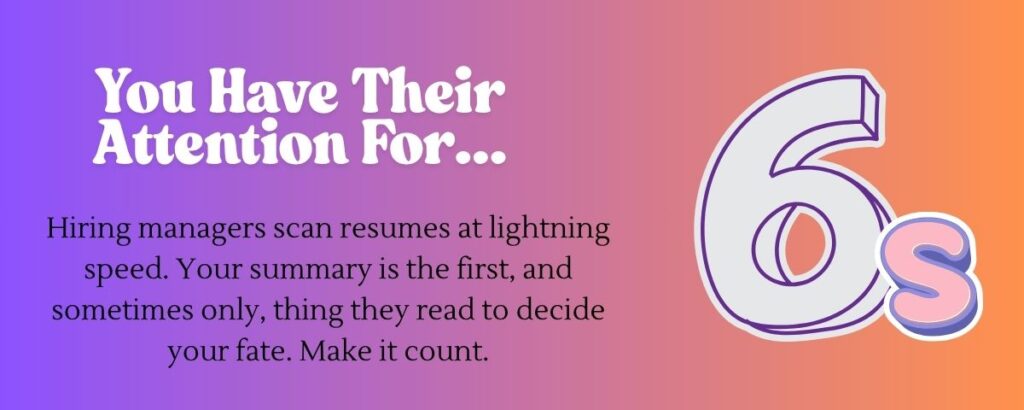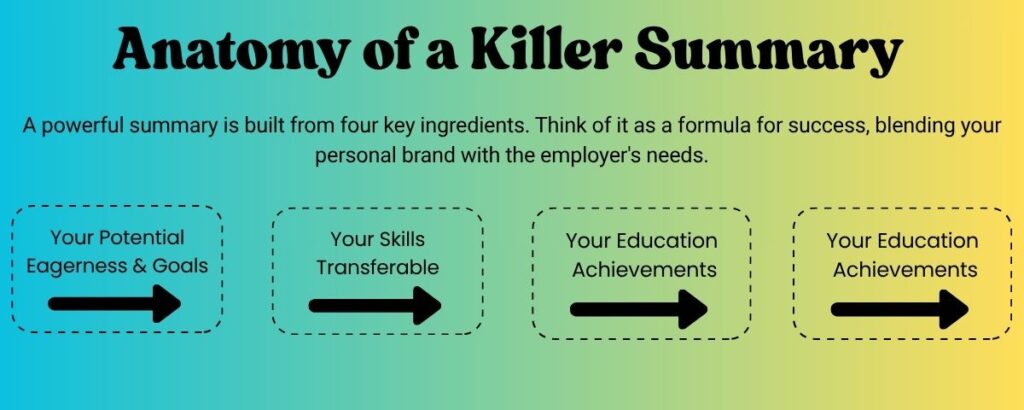Generate Your Perfect Resume Summary
Provide details about your background, and this will generate a personalized template draft for you. Edit it as it suit the job description and other factors.


When you start your exciting career journey, your resume is your first handshake with potential employers. At the very top, before they even dive into your experiences, lies a powerful tool: your resume summary. This isn’t just a few lines of text; it’s your elevator pitch, a quick, punchy way to convey your value immediately. For freshers like you, this section is particularly crucial because it frames your candidacy and sets the stage for everything that follows. It’s your chance to make a memorable first impression, proving you are the ideal candidate even with limited traditional work history.
But before you dive in, I highly recommend reading this blog all the way through; it’s packed with powerful resume summary examples for freshers and smart tips to help you tailor yours perfectly for the job you’re aiming for.
Provide details about your background, and this will generate a personalized template draft for you. Edit it as it suit the job description and other factors.
Error generating summary. Please try again.
A resume summary is a concise overview of your experience, skills, and career goals, serving as an introduction to your resume and highlighting your most significant achievements. Think of it as a compelling “teaser” or a “snapshot of your professional life”. For experienced professionals, this section summarises past accomplishments. A resume summary serves as a quick snapshot of your professional identity, helping recruiters assess your fit and increasing your chances of passing ATS screenings. However, for freshers, its purpose shifts: it becomes a powerful statement showcasing your potential. This brief paragraph, typically spanning three to five sentences, is meticulously crafted to align with each specific job description you apply for.
When you are just starting out, the primary challenge often lies in a lack of extensive work history. Traditional resume summaries are inherently backwards-looking, designed to summarise what you have already accomplished. However, a truly effective summary for a beginner emphasises your eagerness to learn, your adaptability, and your immense growth potential. This isn’t merely a minor adjustment; it’s a profound transformation in how your summary functions. Crafting a professional summary as a fresher means creating a tailored, impactful introduction that highlights your strengths and aspirations. It meholdour introductory statement must be forward-looking, highlighting what you are capable of doing and who you are poised to become, rather than solely recounting past deeds. This approach empowers you, shifting the focus from any perceived deficit in experience to an abundance of future value. Recruiters actively seek these very traits in entry-level candidates, making this forward-looking perspective a critical differentiator in your job application.
When approaching this section, remember that the summary for a resume should be concise, targeted, and customised for each job application to maximise its impact. Writing a resume summary is a key step for freshers to present themselves effectively to recruiters and pass ATS screenings.

In today’s highly competitive job market, standing out is absolutely essential, and a well-crafted resume summary can be a significant positive differentiator for you. A good resume summary is a concise, tailored overview that highlights your key skills, achievements, and experience relevant to the specific job, making it effective in capturing attention. Hiring managers, on average, spend a mere six to ten seconds scanning a resume. This means your initial statement is your prime opportunity to capture their attention swiftly and effectively. Many applicants often bypass this crucial section, jumping directly into their work experience, thereby missing a vital chance to make an immediate impact. A thoughtfully written summary provides essential context right from the start, helping the hiring manager immediately grasp why you are applying and how your skills align with the specific job requirements. For job seekers, especially those entering the job market, a strong summary is crucial for showcasing relevant skills and making a memorable first impression. This strategic placement allows you to control the very first impression you make, guiding the recruiter’s perception of your candidacy.
A truly effective resume summary should always include your most relevant skills, your educational background, your clear career objectives, and a balanced showcase of both technical and soft skills. It must be concise, exceptionally clear, and laser-focused on your most significant achievements, even if those achievements come from academic projects or extracurricular activities. For entry-level applicants like yourself, a compelling summary typically highlights your eagerness to learn, your adaptability, your inherent growth potential, and your career aspirations. It serves as a brief snapshot of your professional life, usually spanning just three to five sentences, and should be carefully tailored for each specific job description you apply for. Furthermore, it should clearly state your professional title (or the title you aspire to), your key skills—including soft skills—and any measurable achievements that will immediately entice the recruiter to learn more about you.
Think of the job description as a treasure map, guiding you to exactly what the employer is seeking. To craft a truly impactful resume summary, you must first become a master detective, meticulously analysing this map. It is essential to read the job description carefully to identify the key skills and qualifications the employer values most. This deep dive isn’t just about understanding the role; it’s about speaking the employer’s language and ensuring your resume gets past the initial digital gatekeepers.

To write a truly effective resume summary, you absolutely need to understand the job description and all its requirements thoroughly. Your task is to identify the key skills and qualifications that the job demands, paying close attention to any terms mentioned multiple times or those that appear to be emphasised. This meticulous analysis allows you to precisely tailor your summary, ensuring it directly addresses the employer’s needs.
Applicant Tracking Systems (ATS) are sophisticated software programs utilised by most large employers to pre-screen resumes before a human recruiter even has a chance to see them. These systems are designed to identify specific keywords and evaluate a candidate’s skills and strengths. Customising your profile summary for each job application is crucial because it significantly enhances your alignment with the role and dramatically increases your chances of passing through these ATS filters. This approach is especially important for entry-level job seekers, as tailoring the summary helps highlight relevant skills, educational background, and transferable experiences to compensate for limited work history. Therefore, you must strategically use keywords extracted directly from the job description to make your summary more effective and visible. It’s also highly beneficial to include the exact job title from the description in your resume; research indicates that resumes featuring the job title in the headline receive. Times more interview invitations.
As a fresher, you might initially feel you lack “experience,” but that perception is rarely accurate. In reality, you possess a wealth of valuable abilities gained from your academic journey, extracurricular activities, and various personal projects. These are your transferable skills, and they are your secret weapon in convincingly demonstrating your readiness and immense potential to employers.

Transferable skills are absolutely essential for freshers because they are versatile abilities that can be effectively applied across a wide range of jobs and industries. These valuable skills are acquired from diverse experiences, including any past part-time jobs, volunteering, internships, your college coursework, or even personal projects you’ve undertaken. They encompass crucial competencies such as communication, problem-solving, teamwork, research, leadership, adaptability, problem-solving abilities, organisational and communication skills, and leadership skills. By prominently highlighting these skills, you can effectively compensate for a lack of direct professional experience and truly differentiate yourself from other candidates.
The core challenge for freshers often revolves around the perceived “no experience” barrier. However, the true nature of transferable skills reveals that they are abilities gained from any experience, not just formal employment. This reframes the issue entirely: the challenge isn’t a complete absence of experience, but rather a lack of traditional, paid work experience. Transferable skills provide a powerful mechanism for you to reframe your diverse life experiences—from leading a student club to managing a complex academic project—into valuable professional assets. This reframe is incredibly empowering. It shifts the focus from any perceived deficit (“no experience”) to an abundance of relevant abilities that you already possess. It encourages you to think broadly and creatively about your accomplishments and how they can be directly applied in a professional context, thereby directly addressing and overcoming the “no experience” dilemma.

Our resume summary is your personal billboard. To truly make it shine, you need to choose your words wisely and back up your claims with concrete evidence. Highlight your proven track record of success and your proven ability in key areas by showcasing specific, measurable achievements. This means using dynamic language that grabs attention and quantifying your achievements to show, not just tell, the impact you can make.
A strong resume summary should always be concise, crystal clear, and sharply focused on your most significant achievements. Aim to keep your summary brief, typically spanning just two to four sentences. For new college graduates, a three-line summary is often considered ideal, delivering maximum impact in minimal space. It is crucial to avoid jargon overload or overly complicated wording that might obscure your message.
To help you craft your own, see the summary example below that demonstrates how to highlight your skills and experience effectively.
Using powerful words and dynamic action verbs in your resume summary will make your skills and experiences truly stand out. Instead of resorting to passive phrases like “responsible for,” opt for strong, assertive verbs such as “managed,” “created,” “developed,” “analysed,” or “coordinated”. These verbs are designed to invigorate your resume and immediately capture the recruiter’s attention. Furthermore, strive to vary your verb choices throughout your resume, avoiding repetition to maintain engagement and impact.
It is absolutely crucial to quantify your achievements by including specific numbers and compelling statistics in your resume summary. Metrics serve as hard evidence, proving your accomplishments with concrete data like percentages, dollar amounts, or timeframes. Numbers and figures vividly illustrate the tangible impact you have made and demonstrate precisely how you can help an organisation thrive. Even as a recent graduate, you can draw upon experiences from clubs, school projects, or volunteer work to showcase your impact. For instance, instead of saying you “helped with development costs,” you can state you “reduced development costs by %”. Similarly, rather than “managed social media,” you could say “increased social media engagement by 20%”.
Your journey is unique, and so should be your resume summary. While the core principles remain consistent, tailoring your summary to your specific dream profession and industry is paramount. For example, an operations manager resume summary, business analyst resume summary, cashier resume summary, receptionist resume summary, teacher resume summary, or social worker resume summary each highlights the key skills, experience, and achievements relevant to those professions. This section offers tailored examples, demonstrating how to weave your skills and aspirations into a compelling narrative for various fields.
Resume summaries can be meticulously tailored to align with various professions, ensuring that your application resonates deeply with the specific job requirements. This precise tailoring is crucial because it directly showcases your alignment with the company’s goals and the demands of the role. To achieve maximum effectiveness, you should strategically use industry-specific keywords and terminology throughout your summary. Furthermore, it is vital to highlight your most relevant skills, experiences, and professional background that directly pertain to the profession you are targeting.
For marketing roles, your summary should prominently feature skills such as market research, innovative marketing strategies, creating brand awareness strategies, brand awareness strategies, social media management, and proficiency in essential digital marketing tools. It’s vital to emphasise your ability to create effective online campaigns and develop data-driven sales strategies.
Example (Marketing Fresher): “Enthusiastic Marketing graduate with hands-on experience in digital campaign strategy and social media management. Eager to apply creative content creation skills and knowledge of Google Ads to enhance online presence and boost sales for a dynamic e-commerce company.”
When aiming for software development positions, your summary should focus on your proficiency in programming languages like Java and Python, your understanding of software development methodologies, and your capabilities in data analysis and problem-solving. It’s also beneficial to highlight your academic knowledge, your ability to apply technical knowledge in real-world scenarios, and any experience gained from working on group projects.
Example (Software Engineering Fresher): “Recent Software Engineering graduate with fundamental knowledge of software design, development, and testing. Seeking to utilise a broad educational background with excellent analytical, technical, and programming skills to thrive as an entry-level software engineer.”
For healthcare roles, it’s essential to emphasise your genuine passion for helping others, your experience in patient care, your familiarity with medical terminology, your understanding of healthcare software, and your excellent communication skills. Highlight your strong communication and interpersonal skills, especially any customer service experience that demonstrates empathy and effective interaction.
Example (Healthcare Fresher): “Aspiring healthcare professional with a degree in Nursing, dedicated to providing compassionate patient care and actively participating in interdisciplinary teams. Seeking an entry-level nursing position to apply clinical skills, learn, and grow within a dynamic healthcare environment.”
As a high school student or recent graduate, your resume summary should strategically focus on your educational background, academic achievements, any relevant coursework you’ve completed, and any work experience you may have, even if it’s part-time or volunteer-based. It’s crucial to highlight your transferable skills, such as communication and teamwork, which are valuable in any professional setting.
Example (High School Graduate – No Experience): “Recent high school graduate with a strong academic record and a passion for technology. Completed coursework in computer science and mathematics, and obtained certification in Microsoft Office Suite. Adept at problem-solving and teamwork and eager to apply foundational skills in a dynamic work environment.”
Human resources professionals actively seek resume summaries that are concise, clear, and sharply focused on a candidate’s most significant achievements. For entry-level HR roles, it is paramount to highlight direct relevance to the position’s requirements. You should showcase your practical skills and any hands-on experience, even if gained through internships or relevant coursework.
Example (HR Fresher): “Recent HR graduate with internship experience at a Fortune company, specialising in HRIS implementation and employee onboarding. Reduced new hire orientation time by % through process optimisation. Proficient in Workday, ADP, and talent acquisition strategies, eager to contribute to a dynamic HR team.”
For roles in the finance industry, it is crucial to strategically use financial keywords and industry-specific terminology throughout your summary. Highlight your financial analysis, budgeting skills, exceptional advisory skills, proficiency with accounting software, and possession of a bachelor’s degree, emphasising any experience you have working with numbers and data, along with your strong analytical capabilities. Be sure to quantify your internship achievements and any relevant coursework to demonstrate your practical application of knowledge.
Example (Finance Fresher): “Recent finance graduate with a 9.8 GPA and internship experience at a Fortune company. Proficient in advanced financial modelling, data visualisation, and machine learning applications in finance. Developed a predictive model that improved investment returns by % during internship.”

You have probably heard both “resume summary” and “resume objective” mentioned, and it can certainly be a little confusing. While both typically appear at the top of your resume, their specific purpose for freshers can be quite distinct, especially when targeting entry-level jobs or an entry-level position. Understanding this difference is key to choosing the most effective approach for your unique situation.
A resume objective is a statement that outlines your career goals and job aspirations. Its primary focus is on what you aim to achieve in your career. A resume summary, conversely, offers a concise overview of your experience, skills, and achievements. It emphasises your work history and key accomplishments, showcasing what you bring to the table. Traditionally, an objective was for freshers, while a summary was for experienced professionals. However, for freshers today, a resume summary is often preferred if you possess
any relevant experience (internships, projects, volunteer roles), as it effectively highlights your strengths and achievements. If you genuinely have no relevant experience, an objective might still be suitable.
Ultimately, your resume summary is designed to impress a human being—the recruiter or hiring manager. Understanding their perspective is akin to having an insider’s guide to the job market. They are actively looking for specific signals that tell them you are not just a good candidate, but unequivocally the right candidate for the role, such as strong communication skills.
Human resources professionals actively seek resume summaries that are concise, exceptionally clear, and sharply focused on a candidate’s most significant achievements. They prioritise seeing direct relevance to the role you are applying for. Recruiters, in their fast-paced work, are often quite “lazy” in the sense that they need to see key information within the first ten seconds of reviewing your resume. They distinctly prefer summaries that highlight the value you can bring to their company, rather than simply stating what you desire from the position. Strong summaries go beyond mere qualifications; they explicitly demonstrate your direct relevance to the role. They particularly value practical skills, technical skills, and hands-on experience, even if acquired through internships or relevant coursework.
You have now explored the incredible power of a well-crafted resume summary, especially as a fresher. This small but mighty section can truly open doors, transforming your potential into tangible opportunities. Remember, every step of your job search is a chance to showcase your unique capabilities and unwavering drive.
A well-crafted resume summary is absolutely essential for freshers to successfully stand out in today’s competitive job market. Its importance cannot be overstated, as hiring managers typically spend only a few fleeting seconds reviewing each resume, making it critically vital for candidates to capture their attention swiftly. Your summary should strategically incorporate relevant skills, highlight your educational background, and articulate your career objectives to achieve maximum effectiveness. Always remember to tailor your summary meticulously to the specific job you are applying for, and consistently use industry-specific keywords and terminology to enhance its impact. Strive for conciseness and clarity, focusing on your most significant achievements, and always quantify them whenever possible to demonstrate tangible results.